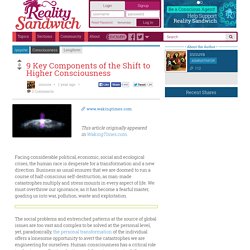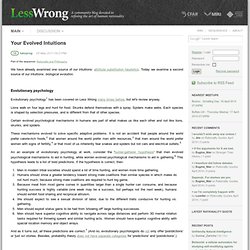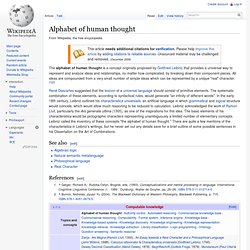

Self Help. Traits of the disciplined mind. The First Map Showing All the Connections in Your Brain's White Matter. There is No Such Thing as An Original Idea. 9 Key Components of the Shift to Higher Consciousness. This article originally appeared in WakingTimes.com.

Facing considerable political, economic, social and ecological crises, the human race is desperate for a transformation and a new direction. Business as usual ensures that we are doomed to run a course of half-conscious self-destruction, as man-made catastrophes multiply and stress mounts in every aspect of life. We must overthrow our ignorance, as it has become a fearful master, goading us into war, pollution, waste and exploitation.
The social problems and entrenched patterns at the source of global issues are too vast and complex to be solved at the personal level, yet, paradoxically, the personal transformation of the individual offers a lonesome opportunity to avert the catastrophes we are engineering for ourselves. The shift. Personal evolution is both the great duty and the great joy of all human beings and is a process of divine significance, frequently unfolding in overlapping stages and related developments. 1. 2. 3. 4. 5. Your Evolved Intuitions. Part of the sequence: Rationality and Philosophy We have already examined one source of our intuitions: attribute substitution heuristics.

Today we examine a second source of our intuitions: biological evolution. Evolutionary psychology Evolutionary psychology1 has been covered on Less Wrong many times before, but let's review anyway. Lions walk on four legs and hunt for food. Certain evolved psychological mechanisms in humans are part of what makes us like each other and not like lions, skunks, and spiders. These mechanisms evolved to solve specific adaptive problems. An an example of evolutionary psychology at work, consider the 'hunter-gatherer hypothesis' that men evolved psychological mechanisms to aid in hunting, while women evolved psychological mechanisms to aid in gathering.6 This hypothesis leads to a list of bold predictions.
And as it turns out, all these predictions are correct.7 (And no, evolutionary psychologists do not only offer 'postdictions' or 'just so' stories. Notes. Logical Fallacies. Top 10 Thinking Traps Exposed. Our minds set up many traps for us. Unless we’re aware of them, these traps can seriously hinder our ability to think rationally, leading us to bad reasoning and making stupid decisions. Features of our minds that are meant to help us may, eventually, get us into trouble. Here are the first 5 of the most harmful of these traps and how to avoid each one of them. 1. The Anchoring Trap: Over-Relying on First Thoughts “Is the population of Turkey greater than 35 million? Lesson: Your starting point can heavily bias your thinking: initial impressions, ideas, estimates or data “anchor” subsequent thoughts.
This trap is particularly dangerous as it’s deliberately used in many occasions, such as by experienced salesmen, who will show you a higher-priced item first, “anchoring” that price in your mind, for example. What can you do about it? Always view a problem from different perspectives. 2. Consider the status quo as just another alternative. Alphabet of human thought. The alphabet of human thought is a concept originally proposed by Gottfried Leibniz that provides a universal way to represent and analyze ideas and relationships, no matter how complicated, by breaking down their component pieces.

All ideas are compounded from a very small number of simple ideas which can be represented by a unique "real" character.[1][2] René Descartes suggested that the lexicon of a universal language should consist of primitive elements. The systematic combination of these elements, according to syntactical rules, would generate "an infinity of different words". In the early 18th century, Leibniz outlined his characteristica universalis, an artificial language in which grammatical and logical structure would coincide, which would allow much reasoning to be reduced to calculation. Leibniz acknowledged the work of Ramon Llull, particularly the Ars generalis ultima (1305), as one of the inspirations for this idea.
See also[edit] References[edit] 15 Styles of Distorted Thinking.